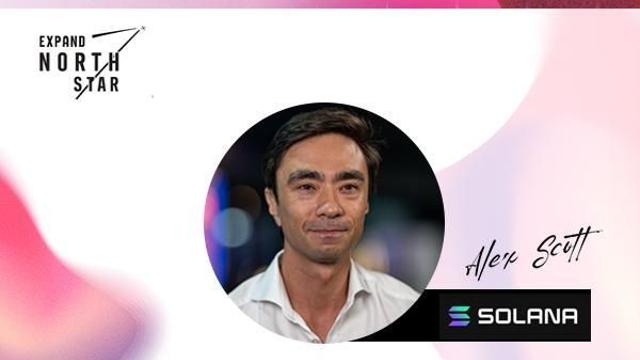SEOUL, October 22 (AJP) – A passionate crypto community backed by financial stability and regulatory transparency rarely found across Asia-Pacific makes South Korea a key strategic focus for Solana, one of the world’s top five blockchain platforms, according to its regional head.
“For us, South Korea within APAC is definitely one of our key strategic focus areas,” said Alex Scott, head of Solana Middle East, in an exclusive interview with AJP during the Expand North Star event in Dubai last week. “The country combines strong financial institutions, clear regulations, and a passionate community of builders. Our focus is on connecting young startups with established institutions to strengthen the overall ecosystem.”
Hosted by the Dubai Chamber of Digital Economy, the event is one of the world’s largest tech and startup gatherings, bringing together blockchain innovators and investors from more than 100 countries.
Alongside Ethereum, Solana ranks among the most widely used blockchain networks globally, supporting a wide range of digital services — from finance and gaming to enterprise technology — through its fast, low-cost system and native cryptocurrency, SOL.
Scott described Korea as “one of the world’s most active crypto markets by participation and volume, with a strong developer base and a vibrant community.” He highlighted programs such as the Seoulana Hackathon and Startup Village Seoul as examples of Korea’s creativity and innovation. “It’s where we consistently see outsized energy,” he said, calling the country both “a demand center and a testbed for innovation.”
Scott said Solana’s strategy for Korea over the next 18 months focuses on four main pillars.
The first is expanding the real-world use of stablecoins — digital currencies linked to fiat money such as the Korean won or the U.S. dollar. “We’re running proof-of-concept projects with local partners to test QR payments, remittances, and cash-in or cash-out services, while keeping regulations front and center,” he said. “One pilot project is helping stores accept stablecoin payments so people can actually spend or withdraw digital money in Korea.” He noted that Korea’s won-based stablecoin already leads the Asia-Pacific market, reflecting the country’s growing strength in digital finance. “Korea can be the proving ground for stablecoin utility in Asia,” he added. “It has dense merchant networks, powerful super-apps that can scale services overnight, and advanced banks willing to design new payment systems — as long as regulation is built in from day one.”
The second pillar involves partnerships with financial institutions and tokenization, a process that turns traditional assets such as funds or ETFs into digital tokens that can be traded more efficiently. “We’re working with major financial institutions on tokenized funds and ETF-related products,” Scott said. “We help them build the right infrastructure — from secure digital wallets to compliance tools — so they can operate safely and at scale.” He cited a new partnership with Shinhan Investment Corp., one of Korea’s largest financial groups. “Through that partnership, we’re expanding Korea’s digital asset ecosystem and bringing more real-world assets onto the blockchain,” he said. Solana is also collaborating with asset managers and brokers to develop tokenized funds and secure wallets with built-in KYC and AML systems to protect investors.
The third focus area is nurturing Korea’s developer ecosystem. Solana is investing in hackathons, research grants, and training programs to foster what Scott calls a “Korea-first” generation of applications. “These include new tools in finance, CeDeFi — combining centralized and decentralized finance — and creative industries,” he said. “These efforts not only attract young developers but also help connect startups with large companies, creating a continuous cycle of innovation between individuals and institutions.”
The final pillar centers on policy and regulation, ensuring that all Solana projects align with Korea’s evolving digital asset framework. “We’re closely following Korea’s policy framework for stablecoins and digital assets to make sure every project aligns with future regulations rather than operating in isolation,” Scott said. “We expect rules around KRW-based stablecoins to advance quickly.” He praised Korea’s open approach to innovation, adding, “Korea combines technical talent, strong financial institutions, and a forward-looking regulatory mindset. It’s where we can show the world what digital assets can actually do in real life — not just in theory.”
Looking beyond Korea, Scott said Solana sees the most promising opportunities across Asia’s finance, gaming, and digital infrastructure sectors. “In finance, stablecoin payments and cross-border transfers are the fastest ways to attract daily users, and that’s where Solana’s speed and low costs make a difference,” he said. “In gaming and the creator economy, small digital payments and automatic rewards — for watching, creating, or trading — fit perfectly with Korea and Japan’s strong content industries. And in infrastructure, better wallet systems and secure digital networks for banks and brokers will open the door to larger institutional participation.”
He noted that Singapore’s blockchain market is driven mainly by institutions with clear licensing, while Japan focuses on gaming and creative industries supported by new Web3 policies. “Korea,” he said, “sits between the two — with strong financial players, active users, and an ecosystem ready to lead Asia’s next wave of blockchain innovation.”
